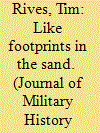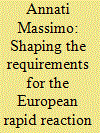| Srl | Item |
| 1 |
ID:
133132


|
|
|
|
|
| Publication |
2014.
|
| Summary/Abstract |
Given the importance of General Dwight D. Eisenhower's decision to launch the invasion of Normandy on 6 June 1944, both to the outcome of the war and to him personally, it is mysterious that neither he nor the commanders who witnessed his supreme moment could agree on what he said when he set the Allied force in motion. While the fog of war explains some of the discrepancies in the eyewitness accounts, Eisenhower's modest character also plays a role in the mystery. Seventy years later, we still do not know what words unleashed the Allied assault on the Atlantic Wall.
|
|
|
|
|
|
|
|
|
|
|
|
|
|
|
|
| 2 |
ID:
018899


|
|
|
|
|
| Publication |
2001.
|
| Description |
58-72
|
|
|
|
|
|
|
|
|
|
|
|
|
|
|
|
| 3 |
ID:
084935


|
|
|
|
|
| Publication |
2008.
|
| Summary/Abstract |
Why do American presidents, when engaged in military coercion, sometimes bluff or exaggerate their resolve and other times do not? Bluffing increases the likelihood and lowers the cost of success, so a failure to bluff provides an intriguing puzzle. It is argued here that American presidents are more likely to bluff resolve when they face an opposition with a dovish public image, and when that opposition perceives a low likelihood that the adversary will call its bluff. The analysis of presidential signalling of resolve in Kosovo and Iraq supports claims by Kenneth Schultz that the opposition party has a tendency to expose presidential bluffing. I also show, however, that the opposition is significantly more likely to expose presidential bluffing when its party has a hawkish image - the public perception of the party's competence on national security and its willingness to use force - and when the opposition perceives a high probability that the bluff will be called. When the president knows the opposition is likely to expose a bluff, it makes sense for him to refrain from overstating resolve. Presidential bluffing is likely to occur when the opposition party has a dovish public image and when the opposition perceives a low probability that the bluff will be called. These findings have direct implications for American leaders and American threats to use force after the end of the George W. Bush presidency.
|
|
|
|
|
|
|
|
|
|
|
|
|
|
|
|